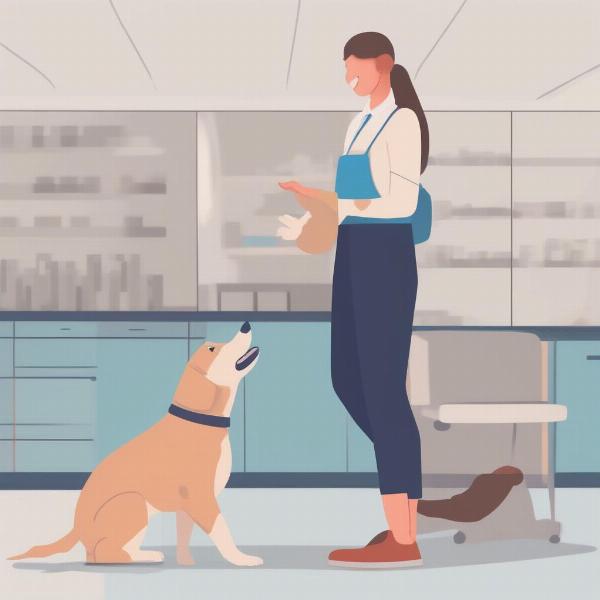Finding suitable dog boarding for a reactive dog can be challenging. Reactive dogs, who often exhibit heightened anxiety, fear, or aggression in certain situations, require specialized care and understanding. This guide offers valuable insights and practical tips for choosing the right boarding experience for your reactive dog, ensuring their safety, comfort, and well-being while you’re away.
Understanding Your Reactive Dog’s Needs
Before searching for dog boarding, assess your dog’s specific triggers and reactivity levels. Does your dog react to other dogs, strangers, loud noises, or specific environments? Knowing their triggers is crucial for selecting a boarding facility equipped to handle their needs. Consider your dog’s comfort levels with different types of interactions and environments. Some dogs might prefer minimal contact with other dogs, while others may tolerate small, controlled playgroups with carefully selected companions.
Choosing the Right Boarding Facility for Your Reactive Dog
Not all boarding facilities are created equal, especially for reactive dogs. Look for facilities that prioritize individual attention, offer customized care, and have experience working with reactive dogs. Ask about their staff’s training in canine behavior and their approach to managing reactive dogs. A good boarding facility will ask detailed questions about your dog’s triggers, behavior, and needs to develop a tailored plan.
Key Considerations When Selecting a Facility
- Limited Dog Interaction: Choose a facility that offers private spaces or limited contact with other dogs. This reduces the risk of triggering your dog’s reactivity.
- Individualized Attention: Look for facilities with low dog-to-staff ratios, ensuring your dog receives personalized care and attention.
- Experienced Staff: Ensure the staff is knowledgeable and experienced in handling reactive dogs, understanding their specific needs and triggers.
- Stress-Free Environment: Opt for a facility with calm and quiet spaces, minimizing potential stressors like loud noises or excessive activity. Ask about their procedures for minimizing stress during feeding, cleaning, and other routine activities.
Preparing Your Reactive Dog for Boarding
Proper preparation can significantly reduce your dog’s stress during their stay. Introduce your dog to the facility before their boarding date, allowing them to familiarize themselves with the smells, sounds, and environment. Pack familiar items like their bed, toys, and blankets to provide comfort and reduce anxiety. Maintain their regular feeding and exercise routine as much as possible to create a sense of normalcy. Inform the staff about any medications, supplements, or special dietary requirements.
What to Ask the Boarding Facility
- Specific protocols for reactive dogs: How do they manage interactions between dogs? What strategies do they use to de-escalate reactive behavior?
- Staff training and experience: What kind of training does the staff have in canine behavior and reactivity?
- Emergency procedures: What is their protocol in case of a behavioral incident or medical emergency?
- Medication administration: Are they comfortable administering medications if needed?
- Updates and communication: How will they keep you updated on your dog’s well-being during their stay?
 Reactive dog meeting staff member at a boarding facility.
Reactive dog meeting staff member at a boarding facility.
Managing Expectations and Post-Boarding Transition
Even with the best preparation, your reactive dog may experience some stress during boarding. Be patient and understanding during their transition back home. Give them space and time to readjust to their familiar environment. Avoid overwhelming them with excessive attention or activities immediately after their return.
Conclusion
Finding the right dog boarding for reactive dogs requires careful research and planning. By understanding your dog’s individual needs, choosing a suitable facility, and preparing them adequately, you can ensure a safe, comfortable, and stress-free boarding experience for your furry friend. Remember to prioritize individualized care, experienced staff, and a calm environment to create a positive boarding experience for your reactive dog.
FAQ
- How much does boarding for reactive dogs cost? The cost varies depending on the facility, location, and level of care required. Specialized care for reactive dogs may incur additional fees.
- Can I bring my dog’s own food to the boarding facility? Most facilities allow you to bring your dog’s own food to maintain their regular diet and minimize digestive upset.
- What if my dog has a medical condition in addition to being reactive? Inform the boarding facility about any medical conditions, medications, and special needs your dog may have. Choose a facility equipped to handle both behavioral and medical needs.
- How can I help my dog adjust to being back home after boarding? Give your dog time to readjust, maintain a calm environment, and avoid overwhelming them with attention or activities immediately after their return.
- What are some signs that a boarding facility is not a good fit for my reactive dog? Red flags include lack of experience with reactive dogs, overcrowded environments, and a dismissive attitude towards your dog’s specific needs.
- Can I visit the boarding facility before booking? Most facilities welcome visits so you can see the environment and meet the staff before making a decision.
- What should I do if my dog’s reactivity worsens during their stay? Communicate with the boarding facility staff immediately. They should have a plan in place to address any behavioral issues that may arise.
ILM Dog is a global online resource dedicated to providing reliable and practical advice on all aspects of dog care. We cover a wide range of topics, including breed selection, health care, training, nutrition, grooming, exercise, puppy care, senior dog care, and traveling with dogs. Our expert insights and helpful tips cater to dog owners of all experience levels, helping you provide the best possible care for your canine companion. We specialize in offering advice on dog breeds, health & medical care, training and behavior, and finding the best products and accessories for your canine friend. For any inquiries or expert advice, reach out to us via email at [email protected] or call us at +44 20-3965-8624. ILM Dog is here to support you every step of the way on your dog ownership journey!